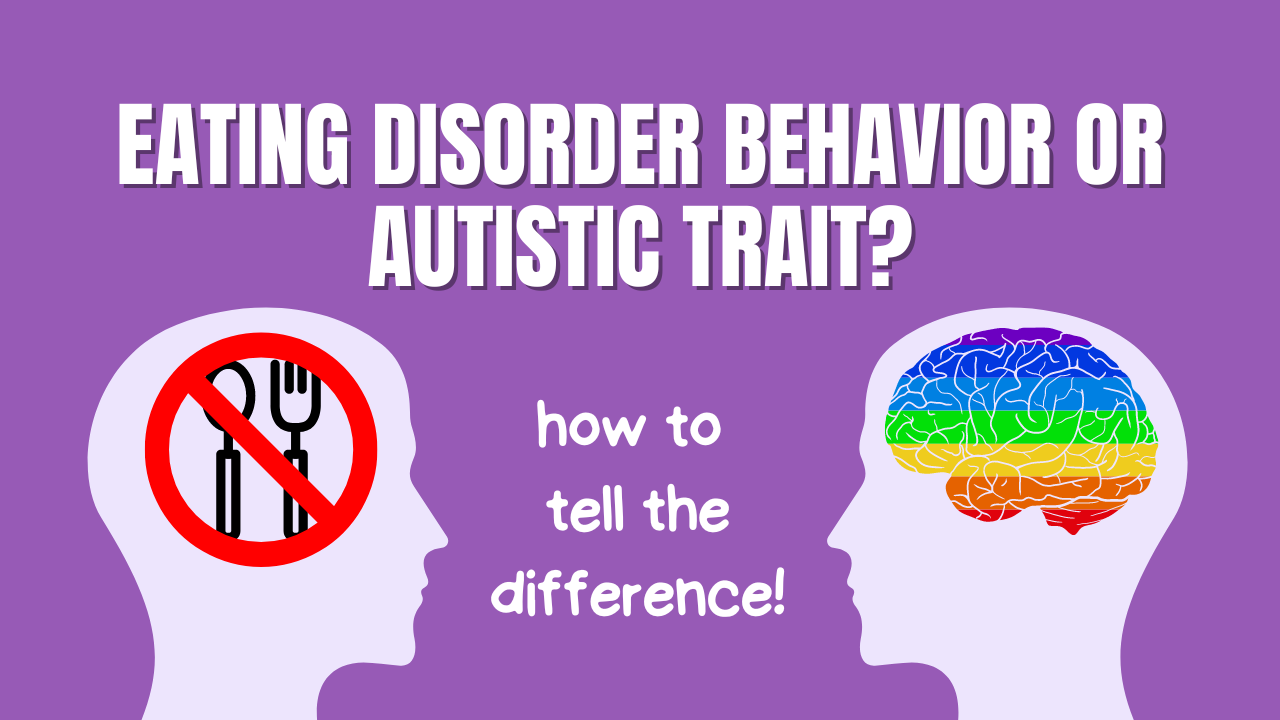Eating disorder behavior or autistic trait? How to tell the difference!
Oct 24, 2022
How can you tell if a behavior is stemming from the autism or from the eating disorder? It can be really tricky distinguishing the two because eating disorder behaviors are often rooted in autistic traits.
Some examples:
- Is eating the same foods everyday an autistic desire for sameness, or is it the ED’s way to restrict?
- Does difficulty with weight gain reflect autistic difficulty with change, or is it rooted in the ED’s fear of fatness?
- Is looking at the menu before going to a restaurant an autistic way to reduce overwhelm, or is it a way for the ED to plan the “healthiest” option?
Obviously, these are only a mere three examples of how autism can manifest as an eating disorder, but how to tell where a behavior is coming from, comes down to intention.
I talked about intention quite a bit in my recent post on whether ALL FOODS fit so I’d definitely recommend reading that if you want to learn more about what food freedom really means for someone who’s fully recovered, but in short, being intentional about your actions comes down to one core question and that is:
Am I coming from a place of love or from a place of fear?
When we are coming from a place of love for ourselves, it usually aligns with our autistic preferences. So in the restaurant example, if you know that looking at the menu will reduce your overwhelm and actually make it easier to challenge yourself, you’re coming from a place of love because you can practice something you want to get better at.
When we are coming from a place of fear, however, it’s most likely rooted in the eating disorder. So if you were looking at the menu beforehand just so you could have time to plan out the “healthiest” or lowest calorie option, or figure out ways in which you need to compensate to “deserve” that meal out, this would all be because you’re afraid of weight gain or simply giving yourself permission to honor your hunger and cravings.
Just as I always preach this idea of shifting your focus to living your LIFE rather than focusing solely on “recovery” (because the purpose of recovery isn’t recovery, the purpose of recovery is to live your life!), in the case of differentiating between your autism and your eating disorder, it’s much more constructive to be proactive in your intentions rather than reactive in where something is coming from.
If you are being really intentional with your actions -- in the sense that they are in alignment with the life you want to live -- you will naturally come from a place of love and you will begin to embrace your full self! It’s when we come from a place of fear and restriction because we don’t trust or don’t believe our dream life is possible for us, that we take actions that are not in alignment with the life we want to live. It’s these actions that are governed by the eating disorder, meaning you’re no longer the intentional one behind the steering wheel!
And that’s exactly how I want to leave you today: YOU are the driver of your own life, the creator of your own reality, and you ALWAYS get to choose to take the wheel and steer your car in whatever direction you want it to go. Sometimes, you’ll take a wrong turn and sometimes you’ll get lost and sometimes you’ll need to take a break and give the car a rest, but the thing is, at every single moment, you’re in charge. The eating disorder thoughts may come up like annoying impatient honkers when you don’t immediately accelerate at a green light, but just like with those annoying impatient honkers, you choose to disengage, and you choose to ENGAGE with thoughts of love and positivity.
Asking myself this intention question allows me to distinguish my autism from diet culture to this day, so I have no doubt it will help you in your own life all the same! If you enjoyed this post or got even just a smidge of value from it, please consider a small donation to support my work. There's nothing I love more than providing you with FREE valuable content, but unfortunately, free content doesn't pay for groceries :) Thank you in advance!
XO Liv




